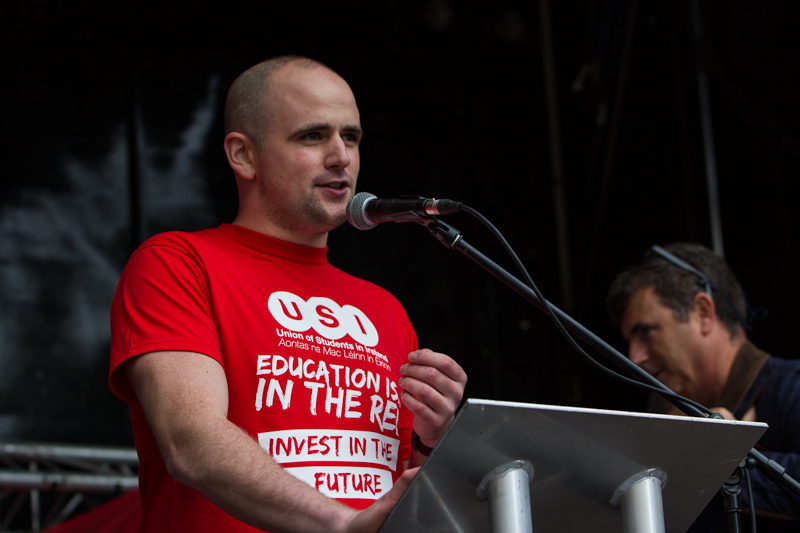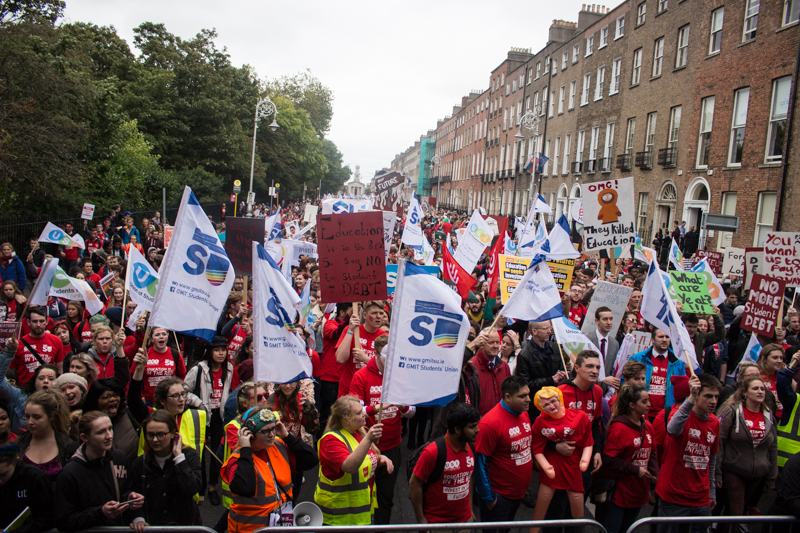Students were called to defy any suggestion of an income-contingent loan scheme today, as speech after speech at the March for Education warned the government of the repercussions of rejecting publicly funded education.
For thousands of students marching today, this message is nothing new. However, with decisions looming and talk of a loan scheme not off the table, for many this could be one of the final pushes before any serious decisions on higher education funding are made.
Earlier today, only hours before students would begin to march on Leinster House, Minister of State for Higher Education Mary Mitchell O’Connor made one of her most strident interventions in the funding debate, telling students they shouldn’t fear “financial pressure”.
It remains to be seen what policy will follow her words – the government has remained firm that a “consensus” approach to funding is needed – but for marchers today, publicly funded education is the only option for the future of the sector.
Addressing the crowd, President of the Union of Students in Ireland (USI) Mike Kerrigan was trenchant in his opposition to student loans. “We are a generation that has been left a lifetime of debt, we’re not fucking taking another one”, he told the 6,000-strong crowd.
“A student loan scheme will mean that if you can afford to pay €20,000 for third level education, that’s what you’ll pay. If you can’t pay €20,000 you’ll pay a lot more…it’s not good enough.”

USI President Michael Kerrigan addresses students at March for Education.
The government, he said, needs to “invest in higher education and make the historic decision to reduce the €3,000 student contribution fee”.
The route of the march might have been different this year, the crowds slightly smaller, but the slogans and chants were the same. Across the city, thousands of students marched to the drumbeat of publicly funded education, calling on the government to invest in young people and higher education.
Irish students were joined by solidarity movements from the UK. Speaking to those gathered in Merrion Square after the march, President of the National Union of Students in Ireland, Olivia Potter-Hughes, maintained that it was a “lie” to say that fees could remain low.
She highlighted the situation in Northern Ireland “where we live in an unsustainable system of loans and debt”, noting that she herself would be nearly “£30,000 pounds in debt” by the time she could expect to pay it back. Northern Irish students also took part in demonstrations of solidarity on social media today.
Potter-Hughes reiterated Kerrigan’s call to action, amid chants of “fund it, fund it” from the crowd: “This is a call to action and let me tell you student activism works…We fought, we lobbied and we won, so I urge you to fight.”
Representatives from Ireland’s higher education unions – SIPTU, Impact, the Teachers Union of Ireland (TUI), and the Irish Federation of University Teachers (IFUT) – also addressed the throngs outside government buildings, including Gina O’Brien, who highlighted the strain on staff and services that the funding crisis has caused: “It’s farcical to think that staff can continue to give our students the appropriate level of service and quality of education they deserve.” She called on attendees to “demand better and demand appropriate funding” for the sector.
Earlier in the day, in Front Square, Trinity College Dublin Students’ Union (TCDSU) President Kevin Keane had addressed students, calling on them to fight against income-contingent loans.
From the Custom House to Merrion Square, for the second time in days, students flooded the streets, after Saturday’s March for Choice. The crowds were smaller, but many of the same students’ unions had made the journey to Dublin from across the country once again.
Barry Kavanagh, Commercial and Communications officer of University College Cork Students’ Union, told The University Times that his institution would be marching today to ensure their financial future, without “such a burden of debt that emigration becomes a viable option”, as well as so that “students can leave college and actually have a chance to get a mortgage. Students do not deserve to be in €20,000 debt leaving college, they deserve to have the world at their fingertips”.
In Trinity, lecturers were told to facilitate students attending the march. And while only a small crowd left Front Square, the Trinity contingent had swelled by the time it made its way to the Custom House.
Crowds, however, were indisputably smaller than last year. Part of this might have been fatigue from two marches in quick succession, but the government’s protracted, consensual approach to funding has certainly hampered the sense of urgency USI brought to the march last year, just months after a government working group recommended loan schemes as one of three options to fund the embattled sector.
Despite the diminished crowd size, in speech after speech, USI reiterated a message that has become familiar over the last few years – that a decision is needed on higher education funding, and that a publicly funded model was the only one acceptable to their organisation.
Smaller students’ unions reported significant turnouts, with Limerick School of Art and Design bringing 200 of its just under 1,000 students to the march.
Dublin Institute of Technology Students’ Union brought a typically large, boisterous crowd. DIT Student’s Union President, Boni Ode, speaking to The University Times by email, was frank on the matter: “With over 42% of our students on a grant the effects of a proposed student loan scheme would be catastrophic for nearly half our student body.” He also spoke about the numbers present at the march: “Last year when we marched we had up to one thousand DIT students present, today DITSU are expecting well over that number.”
Also in attendance was embattled University College Dublin Students’ Union (UCDSU) President Katie Ascough, who in recent weeks has been embroiled in controversy around the removal of material on abortion from the University College Dublin freshers’ guide, Winging It. The UCDSU cohort was one of the smallest at the march. “Our main message here is student debt kills dreams”, she said, speaking to The University Times. “We just want to send out a really strong message to the government that student loans are not an option”, she added.
Also addressing the crowd was former president and current Honorary President of the Irish Secondary Student’s Union (ISSU). “I honestly cannot believe I am back here this year. I should be in school”, she said, lamenting the lack of political will around the issue. She was clear on the mandate of her electorate: “Our members have voted…for fair investment in our education system. We believe in an education system without barriers.”
Students were not the only group marching today. Trade unions and other civil society groups took to the streets to show their solidarity for students, as well as to add their voices to the call for more funding for the sector.

Thousands gather at the Custom House as the march begins.
Speaking to The University Times, Deputy Secretary General of the Irish Federation of University Teachers (IFUT), Frank Jones, stressed the cross demographic importance of the march, and that it is “not just a demonstration for students. It’s a demonstration for everyone, a problem for everyone”. Acknowledging the important role of students and the USI, he went on: “We are marching in solidarity with all others who are involved.”
Dr Martin Marjoram of the Teachers’ Union of Ireland (TUI) also addressed the crowd: “I have been a lecturer for 25 years and believe me I have witnessed with my own eyes the damage that is being done to our education system…We, lecturers, stand with you.”
Similarly, Joe O’Connor, Campaigns Organiser at IMPACT, spoke to The University Times by email about his Union’s presence earlier in the week, remarking that they were “marching today as part of the coalition for publicly funded education, because while the services and supports provided by our members have been deeply affected by underfunding, we don’t believe future generations of students should be saddled with debt to resolve it”.
SIPTU organiser Geoff McEvoy spoke to The University Times on the need for the government to take action: “We’re calling on the state to step up”. He highlighted the fact that the funding issue was not just about loans, but labour: “Work practices are getting worse with more part time and temporary contracts. It’s about making our colleges better places to study and work.”
Social Democrats Councillor Gary Gannon was strident in his opposition as he addressed the crowds in Front Square this morning: “Don’t let the great centrists of our time tell you that we must do it for the balance sheets. It is much more than that.”
Sinn Féin’s Senator Fintan Warfield was also in attendance. Speaking to The University Times, he commented that he was “here in solidarity with students across Ireland and the USI in making it clear that students can’t afford up to €20,000 of debt and any post-Cassells report decision has to be a publicly funded one…This has to happen in a civil, civic society”.
Ciaran Molloy, Kathleen McNamee, Grace d’Arcy, Aisling Marren and John Conway contributed reporting to this piece.







